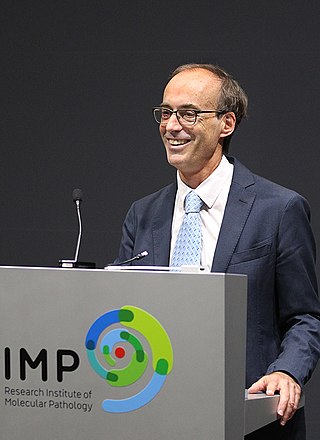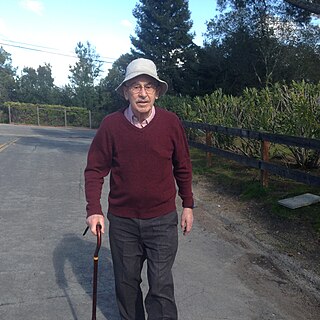
Susan Lee Lindquist, ForMemRS was an American professor of biology at MIT specializing in molecular biology, particularly the protein folding problem within a family of molecules known as heat-shock proteins, and prions. Lindquist was a member and former director of the Whitehead Institute and was awarded the National Medal of Science in 2010.

Edmund Beecher Wilson was a pioneering American zoologist and geneticist. He wrote one of the most influential textbooks in modern biology, The Cell. He discovered the chromosomal XY sex-determination system in 1905. Nettie Stevens independently made the same discovery the same year and published shortly thereafter.

The Linnean Medal of the Linnean Society of London was established in 1888, and is awarded annually to alternately a botanist or a zoologist or to one of each in the same year. The medal was of gold until 1976, and is for the preceding years often referred to as "the Gold Medal of the Linnean Society", not to be confused with the official Linnean Gold Medal which is seldom awarded.
Peter Gerald Satir is an American microbiologist who has spent his career studying the basis of motion by studying the cilium. He is a native of New York, graduated from the Bronx High School of Science in 1952, received his PhD from the Rockefeller University in 1961 and worked at the Department of Anatomy and Structural Biology at the Albert Einstein College of Medicine.

Peter Walter is a German-American molecular biologist and biochemist. He is currently the Director of the Bay Area Institute of Science at Altos Labs and an emeritus professor at the Department of Biochemistry and Biophysics of the University of California, San Francisco (UCSF). He was a Howard Hughes Medical Institute (HHMI) Investigator until 2022.
The American Society for Cell Biology (ASCB) is a professional society that was founded in 1960.
This lecture, named in memory of Keith R. Porter, is presented to an eminent cell biologist each year at the ASCB Annual Meeting. The ASCB Program Committee and the ASCB President recommend the Porter Lecturer to the Porter Endowment each year.
The American Society for Cell Biology's highest honor for Public Service, the ASCB Public Service Award is for outstanding national leadership in support of biomedical research. The awardees are selected by the ASCB Public Policy Committee.
Joel Rosenbaum is a professor of cell biology at Yale University.

Elaine V. Fuchs is an American cell biologist known for her work on the biology and molecular mechanisms of mammalian skin and skin diseases, who helped lead the modernization of dermatology. Fuchs pioneered reverse genetics approaches, which assess protein function first and then assess its role in development and disease. In particular, Fuchs researches skin stem cells and their production of hair and skin. She is an investigator at the Howard Hughes Medical Institute and the Rebecca C. Lancefield Professor of Mammalian Cell Biology and Development at The Rockefeller University.

Barbara J. Meyer is a biologist and geneticist, noted for her pioneering research on lambda phage, a virus that infects bacteria; discovery of the master control gene involved in sex determination; and studies of gene regulation, particularly dosage compensation. Meyer's work has revealed mechanisms of sex determination and dosage compensation—that balance X-chromosome gene expression between the sexes in Caenorhabditis elegans that continue to serve as the foundation of diverse areas of study on chromosome structure and function today.
William R. "Bill" Brinkley, was an American cellular biologist and scientific advocate and served as a Professor and Dean of the Graduate School of Biomedical Sciences at Baylor College of Medicine. Brinkley was recognized particularly for contributing to discovery of the attachment of chromosomes to the mitotic spindle apparatus.
Richard Olding Hynes is a British biologist, a Howard Hughes Medical Institute Investigator, and the Daniel K. Ludwig Professor for Cancer Research at the Koch Institute for Integrative Cancer Research, Massachusetts Institute of Technology (MIT). His research focuses on cell adhesion and the interactions between cells and the extracellular matrix, with a particular interest in understanding molecular mechanisms of cancer metastasis. He is well known as a co-discoverer of fibronectin molecules, a discovery that has been listed by Thomson Scientific ScienceWatch as a Nobel Prize candidate.

Ronald David Vale ForMemRS is an American biochemist and cell biologist. He is a professor at the Department of Cellular and Molecular Pharmacology, University of California, San Francisco. His research is focused on motor proteins, particularly kinesin and dynein. He was awarded the Canada Gairdner International Award for Biomedical Research in 2019, the Shaw Prize in Life Science and Medicine in 2017 together with Ian Gibbons, and the Albert Lasker Award for Basic Medical Research in 2012 alongside Michael Sheetz and James Spudich. He is a fellow of the American Academy of Arts and Sciences and a member of the National Academy of Sciences. He was the president of the American Society for Cell Biology in 2012. He has also been an investigator at the Howard Hughes Medical Institute since 1995. In 2019, Vale was named executive director of the Janelia Research Campus and a vice president of HHMI; his appointment began in early 2020.
Zena Werb was a professor and the Vice Chair of Anatomy at the University of California, San Francisco. She was also the co-leader of the Cancer, Immunity, and Microenvironment Program at the Hellen Diller Family Comprehensive Cancer Center and a member of the Executive Committee of the Sabre-Sandler Asthma Basic Research Center at UCSF. Her research focused on features of the microenvironment surrounding cells, with particular interest in the extracellular matrix and the role of its protease enzymes in cell signaling.
David Domingo Sabatini is an Argentine-American cell biologist and the Frederick L. Ehrman Professor Emeritus of Cell Biology in the Department of Cell Biology at New York University School of Medicine, which he chaired from 1972 to 2011. Sabatini's major research interests have been on the mechanisms responsible for the structural complexity of the eukaryotic cell. Throughout his career, Sabatini has been recognized for his efforts in promoting science in Latin America.

Ian Read Gibbons, was a biophysicist and cell biologist. He discovered and named dynein, and demonstrated energy source as ATP is sufficient for dynein to walk on microtubules. In 2017, he and Ronald Vale received the Shaw Prize for their research on microtubule motor proteins.
John R. Pringle is an American scientist. He is a professor at Stanford University. He received an AB in Mathematics from Harvard University and a PhD in Biology also from Harvard University (1970).
Peter N. Devreotes is an American scientist and the Isaac Morris & Lucille Elizabeth Hay Professor and former director of the department of cell biology, with joint appointments in the Center for Cell Dynamics and department of biological chemistry at the Johns Hopkins University School of Medicine. He also serves on the scientific advisory board of the Allen Institute for Cell Science. He is best known for his contribution in the field of eukaryotic chemotaxis, signal transduction, and phosphoinositides biology.







